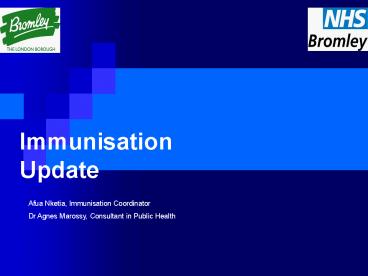Immunisation Update - PowerPoint PPT Presentation
1 / 22
Title:
Immunisation Update
Description:
Afua Nketia, Immunisation Coordinator Dr Agnes Marossy, Consultant in Public Health Immunisation Immunisation is one of the most effective public health interventions. – PowerPoint PPT presentation
Number of Views:170
Avg rating:3.0/5.0
Title: Immunisation Update
1
Immunisation Update
Afua Nketia, Immunisation Coordinator Dr Agnes
Marossy, Consultant in Public Health
2
Immunisation
- Immunisation is one of the most effective public
health interventions. - The World Health Organisation recommend that
uptake for childhood immunisations should be at
least 95. - We are not achieving this target.
3
Why are we not achieving the target?
- Not enough people being immunised
- We dont always have a record even if someone has
been immunised
4
Why are people not immunised?
- Lack of knowledge-
- Schedule changes- second dose MMR,
- 12 mth baby immunisations
- Misinformation - Wakefield
- Misunderstanding of when immunisations are due -
pre-school booster - Lack of access-hard to reach, language problems,
migration, chaotic lifestyles - Cultural reasons
5
Why dont we know who has been immunised?
- Good question!
6
Why dont we know who has been immunised?
- Before 2010
- After 2010
- Paper records not sent / never arrived in post
- Child moved out of area and records sent away
- Immunisations missed elsewhere not entered on
childs record
- Immunisations on practice system not always
entered on the correct template. Sometimes
deleted by accident - Wrong date of birth, name or other demographic
details - 2 and 3 from before 2010.
7
Bromley position 2008-9
8
Bromley position 2011-12
9
Trends in uptake
10
What have we done to improve
- Knowledge
- Awareness of the schedule, posters, leaflets
- Nursery visits
- Glades adverts
- Access
- Defaulter project
- Misinformation- national approach
- Cultural- gypsy traveller work
- Data quality work. (collection and training)
11
Defaulter project
- Better data- better analysis of individual
practice data - Training all practices to run timely searches
- Defaulter project introduced. Health visitors
and practice working together in targeting
defaulters. This exercise highlighted the health
visitor role in childhood immunisations. - Evaluation of defaulter project indicated a need
to change the process- - Improving immunisation uptake was piloted
following the defaulter project evaluation.
12
Nursery Projects
- All Bromley nurseries asked to take part in
survey about childhood immunisations - 5 nurseries agreed to hold coffee mornings to
raise awareness of childhood immunisations. - Parents were invited to bring their childrens
Red books, to the coffee mornings where a gift
was offered to completely immunised children.
13
Nursery project findings
- Some parents were unsure what immunisations their
children had. The extra MMR in 2008/9 was
especially confusing to most parents. - Most thought the pre-school booster meant just
that.
14
Improving immunisation project
- 30 practices in Bromley were included in the
improving immunisation project. A snapshot of
defaulting children in these practices were
targeted by the Public health team. - Steps-
- team member contacts practice to check if child
has been immunised or has an appointment. - Where required team member contacted the guardian
by phone. - When appointment booked, option of a text
reminder was given. - Where no response to phone calls (9) a home visit
was made - Active refusers had the immunisation record
changed to reflect this.
15
Improving immunisation project evaluation
- The use of prewritten script and text message
reminder successful. - Home visits took up more time than expected and
there was a lower response rate.
16
Improving immunisation project what next
- 37.84 of the defaulter children had previous
immunisations but no record on the GP data base.
? - Encourage practices to implement the processes
used. Non medical staff could make the telephone
call with the aid of the prewritten script. - Encourage practices to use text reminders- many
already do. - Good practice findings to be circulated to
practices.
17
Pathway for unregistered children with incomplete
immunisation history
18
Commissioning for Quality and Innovation (CQUIN)
payment
19
Bromley Immunisation uptake
20
Immunisation uptake at 5 years
21
Immunisation uptake at 2 years
22
Immunisations uptake at 1 year
23
- Thank you for your attention.
- Any questions?































